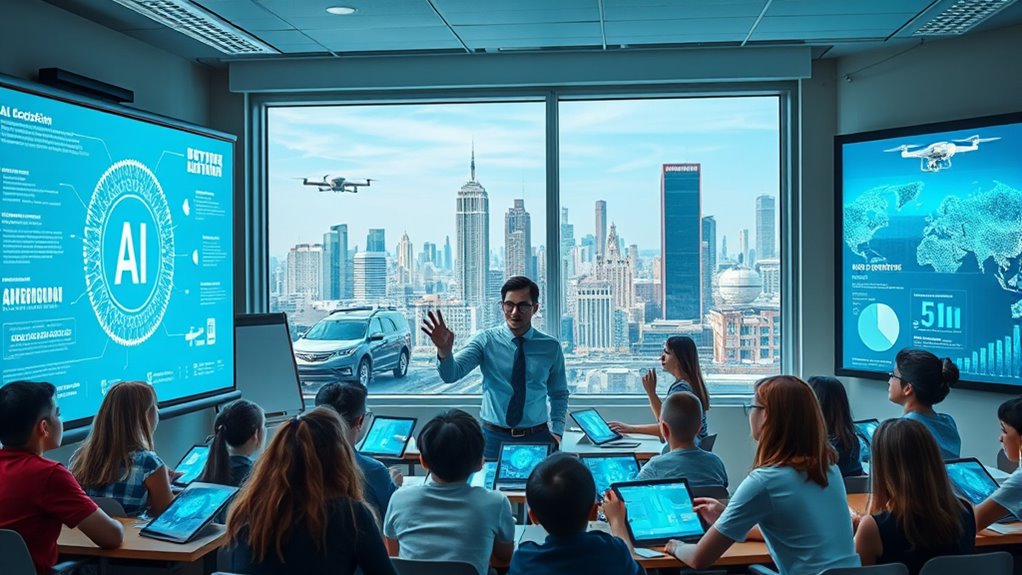To adapt education for an AI-powered economy, you should focus on personalizing learning experiences to match individual needs, interests, and skills. Incorporate AI tools that support early identification of at-risk students and streamline administrative tasks, freeing teachers to engage more deeply. Emphasize ethical use and transparency, ensuring fairness and privacy. By embracing these strategies, you’ll prepare students for a future where human and AI collaboration thrives—if you continue exploring, you’ll discover more effective ways to shape this transformation.
Key Takeaways
- Integrate AI-driven personalized learning to equip students with adaptable skills for an AI-enhanced workforce.
- Emphasize critical thinking and creativity to complement AI tools and foster human-AI collaboration.
- Incorporate AI literacy into curricula to prepare students for evolving technological and ethical challenges.
- Develop flexible, lifelong learning pathways supported by AI to continuously upskill in a dynamic economy.
- Promote ethical AI use and digital literacy to ensure responsible participation in an AI-powered job market.

How can education evolve in an economy increasingly driven by AI? The answer lies in embracing the transformative potential of AI to make learning more personalized, accessible, and effective. With AI, you’re no longer confined to one-size-fits-all teaching methods. Instead, education can adapt to your individual interests, learning styles, and knowledge levels. Studies show that 75% of students feel more motivated in AI-driven personalized environments, compared to just 30% in traditional classrooms. This shift boosts engagement, confidence, and autonomy, making learning feel more relevant and enjoyable. AI tailors content to your specific needs, supporting flexible engagement even if you’re absent or need to revisit material. As a result, course completion rates can soar by 70%, indicating that students stay motivated and committed to their studies. Furthermore, AI helps bridge gaps caused by cultural, language, or educational differences, creating more inclusive classrooms that accommodate diverse learners worldwide.
AI personalizes learning, boosts motivation, and creates inclusive classrooms for diverse learners worldwide.
Early identification of at-risk students becomes more precise with AI. Systems analyze attendance, grades, and engagement patterns to flag potential dropout risks, reducing dropout rates by 15%. This means you get targeted interventions that prevent discouragement and promote persistence. Educators receive actionable insights early on, enabling them to support students before difficulties escalate. Continuous monitoring also helps refine personalized strategies, creating a safety net that keeps students on track and improves overall outcomes.
Teacher support is another essential aspect of AI’s impact. Administrative tasks like grading and scheduling become automated, freeing up your teachers to focus more on direct interactions with students. AI tools can extend their capacity, allowing teachers to support larger groups without sacrificing quality. Intelligent tutoring systems and AI teaching assistants provide additional guidance outside regular hours, ensuring you receive help when needed. These tools also offer adaptive resources tailored to local contexts and diverse student backgrounds, making lessons more relevant. Importantly, education authorities emphasize that AI is a support tool—not a replacement—preserving the essential human element of teaching.
However, integrating AI isn’t without challenges. Algorithms can perpetuate biases, leading to unfair assessments or discrimination if not carefully managed. Transparency and trust issues also arise, especially when AI’s inner workings are opaque. Concerns around data privacy, surveillance, and potential inequities are valid and require thoughtful policy responses. Without proper oversight, AI-generated information might be inaccurate or lack depth, risking misinformation.
As a student, you’re already engaging with AI tools for homework, brainstorming, and research. About 90% of college students use AI for help, expressing a desire for more instructor-led AI integration. While AI can enhance your learning, it also brings frustrations, such as lagging policies or the stress of accusations around misuse. Overall, adapting education to an AI-powered economy means creating a balanced approach—leveraging AI’s strengths to personalize learning, support teachers, and address ethical concerns—so you’re equipped for a future where AI and human skills coexist seamlessly. Additionally, incorporating color accuracy in educational materials can further enhance the learning experience by ensuring that visual content is presented in a way that is both engaging and effective.
Frequently Asked Questions
How Can Educators Stay Updated on Rapidly Evolving AI Technologies?
You can stay updated on rapidly evolving AI technologies by actively participating in AI-focused workshops, webinars, and certification programs. Join professional communities and attend conferences to learn about the latest trends and tools. Follow reputable newsletters, podcasts, and blogs from AI experts. Experiment with AI tools in your teaching, and engage with industry reports and research to understand emerging applications. Collaborate with AI researchers to deepen your knowledge and stay ahead.
What Skills Will Be Most Valuable in an Ai-Driven Job Market?
You’ll find that technical AI skills like machine learning, data science, and prompt engineering are essential, yet equally important are human-centric skills such as creativity, critical thinking, and adaptability. While mastering AI tools boosts your earning potential, cultivating resilience, ethical awareness, and leadership guarantees you thrive amid rapid change. Balancing technical expertise with soft skills empowers you to navigate and excel in an increasingly AI-driven job market.
How Should Curricula Be Redesigned for AI Literacy?
You should redesign curricula by integrating AI literacy early on, combining technical skills like machine learning with ethical considerations. Use real-world applications to make lessons relevant and employ AI-powered tools for personalized learning and adaptive assessments. Encourage critical thinking about AI biases and societal impacts. Foster collaboration through AI-driven tools, and guarantee continuous professional development for teachers to stay updated, creating an inclusive, engaging, and future-ready learning environment.
What Role Should Government Policies Play in AI Education?
Government policies should actively shape AI education, ensuring you have access to ethical, high-quality learning resources. They set standards that foster innovation while safeguarding students from potential risks. By providing funding, creating frameworks, and encouraging collaboration between public and private sectors, policies help you develop essential skills for an AI-driven economy. Your success depends on clear guidance and support that prepares you for the future, making AI literacy a universal priority.
How Can Underserved Communities Access Ai-Focused Educational Resources?
You can access AI-focused educational resources by advocating for increased infrastructure investments, such as affordable internet and devices, in underserved areas. Support community-led initiatives that develop culturally relevant AI curricula and partner with nonprofits and EdTech companies to co-create inclusive tools. Push for policies that prioritize equitable AI deployment, teacher training, and family engagement, ensuring that all students, regardless of background, can benefit from personalized AI learning opportunities.
Conclusion
Now, as you walk through this new landscape, imagine a world where classrooms pulse with innovation, and your skills blend seamlessly with AI tools. Picture yourself steering a future where learning adapts like a chameleon, ready to meet the demands of an AI-powered economy. Embrace the change, knowing that by shaping education today, you’re planting seeds for a future where opportunity blossoms in every corner of this evolving digital horizon.









